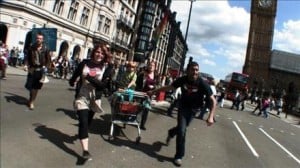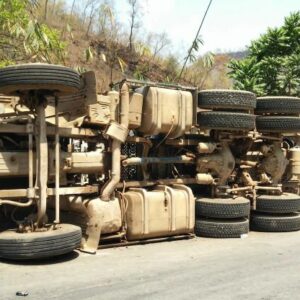As a filmmaker, it’s a rare privilege to stumble upon a completely unique story—in the case of my new documentary, Grasp the Nettle, a motley collection of land rights activists, squatting a three-acre piece of land in the heart of suburban London.
With my video camera and microphone in hand, I decided to give up my job and flat to move in with a group of outsiders who had opened up an urban space with a unique ethos of freedom.
The end result is a film that documents the rise and fall of two radical social experiments in. This wild, unpredictable ride full of inspirations, absurdities and eccentricities, completely transformed my view of what activism can and should be.
Fast-forward a year and a half, after finishing the editing of the film, I find myself attending a talk by renowned environmental and social activist Vandana Shiva, hosted by Schumacher College and the “Transition” group in Totnes, UK. Shiva’s presentation wraps in the ills of GM, the dark side of globalization, and the farmers’ struggle in India against Monsanto.
Shiva is a captivating, inspiring speaker.
I watched a room full of seemingly motivated people acknowledging the importance of “growing our own food.” Why did I feel so uneasy? Perhaps the fact that the two UK communities I have actually been part of that attempted to exist outside of the framework of consumer society—Kew Bridge Eco-Village and the Democracy Village on Parliament Square, both featured in Grasp the Nettle—had been destroyed, to some extent brutally.
It boils down to the fact that the large majority of us, and by us I mean the people on this planet, simply do not have access to land and resources—a fact that is barely recognized as a significant issue.
At stark odds with the mainstream “green” bubble, these two outcomes point to a dirty social and political reality that many seem to want to leave out of the discourse. For even as many in the progressive left are willing to accept the realities of environmental and energy crises, along with the failure of our current economic system, one of the most fundamental issues at the heart of all these problems is land rights.
It boils down to the fact that the large majority of us, and by us I mean the people on this planet (including people in the UK and the West), simply do not have access to land and resources—a fact that is barely recognized in the mainstream as a significant issue.
How can we separate the idea of squatting land from the wider issue of energy and food independence? Occupying disused land needs to become part of the range of tools that our progressive movements in the West embrace with vigor. Acknowledging that we need to “grow our own food” is only the first step, and it will take courage for the mainstream green bubble to be burst.
“To draw up an ecological agenda that has no room for social concerns is as obtuse as to draw up a social agenda that has no room for ecological concerns” —Murray Bookchin
The political class in Britain rules through concentrated land ownership. The entire country’s farmland is in the hands of less than one percent of the population. Just 6,000 owners, mostly the Crown and other aristocrats, but also a few large institutions such as the National Trust and the Church of England, hold 40 of the 60 million acres of Britain. (Not included in that are the current holdings of the Ministry of Defense, which are 592,800 acres.)
This situation maintains a privileged class and a majority disenfranchised of its right to land. The system is enforced with planning laws and legislation.
Even when you play the game and buy your own land, planning law suppresses individual initiative, making it extremely difficult to build your own sustainable home and live freely.
The suppression of people’s efforts to live on the land has been justified by the notion that human presence in nature is detrimental, as if we are somehow separate from it.
The eco-community in the Preseli Mountains of west Wales was set up in 1993. Residents lived happily for five years in self-made, sustainable “Hobbit Homes” on a 180-acre farm bought by Julian and Emma Orbach. Problems began for the community when it was spotted by officials in a survey plane.
Although eventually allowed to stay, establishing the right of occupancy took a decade of legal battles.
Not everyone is so lucky. Ultimately, if you are refused planning permission and refuse to comply, you may face police action—such as the 86 families of Irish Travellers at Dale farm who were evicted in October 2011 from a piece of land that they actually owned. Riot police stormed the site in a brutal eviction that saw two people Tasered and many injured.
None of this is going to change until we mount a significant land rights campaign in the UK—whatever ragtag form it takes. The people in my new film were both ahead of their time and intrinsically linked to past struggles, such as the Diggers of 1649.
The diggers of Grasp the Nettle created a carnival separate from the suffocation of everyday life—and that was only on three acres.
Imagine what we could do with the whole of this Island.
Is concentrated ownership a problem in the United States, or only in Britain? Explain why or why not in COMMENTS.


